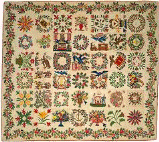Textile Society of America

Textile Society of America: Symposium Proceedings
Date of this Version
2004
Document Type
Article
Citation
Textile Society of America 9th Biennial Symposium, (2004).
Abstract
Weavings and their techniques and attributes, have constantly crossed cultural boundaries whether along trade routes or between neighboring communities. At the same time, they have been claimed as identifiers of their makers’ cultures and territorialized to prevent “stealing.” In contemporary art practice, an act of appropriation is often seen as an act of aggression. Appropriation, from the artist's perspective, serves the purpose of social critique, in particular aimed at the cultural arenas controlled by the art world. However, exchanges that take place through viewing and interpreting the textiles of another culture are under minimal political or social control.
Tapestries fall into the category of “weavings” at the same time as their images place them in the category of cultural art object. To an artist who perceives both categories simultaneously, imagery will include many textile references. This paper will look at the work of Janet Moore, a tapestry artist who has crossed cultural boundaries in her work. As an artist, Moore has informed herself of the currents in contemporary art by reading and participating in several artistic and cultural communities. In her work, she transmutes inner material in a direction that remains compatible with her political worldview. Her work facilitates an examination of the complex political positioning of contemporary cross-cultural engagement.


Comments
Presented at “Appropriation • Acculturation • Transformation,” Textile Society of America 9th Biennial Symposium, Oakland, California, October 7-9, 2004. Copyright 2004 Textile Society of America.